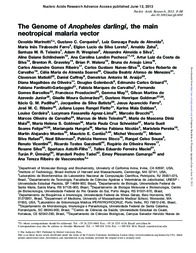The Genome of Anopheles darlingi, the main neotropical malaria vector.
The Genome of Anopheles darlingi, the main neotropical malaria vector.
Author(s): MARINOTTI, O.; CERQUEIRA, G. C.; ALMEIDA, L. G. P. de; FERRO, M. I. T.; LORETO, E. L. da S.; ZAHA, A.; TEIXEIRA, S. M. R.; WESPISER, A. R.; SILVA, A. A.; SCHLINDWEIN, A. D.; PACHECO, A. C. L.; SILVA, A. L. da C.; GRAVELEY, B. R.; WALENZ, B. P.; LIMA, B. de A.; RIBEIRAO, C. A. G.; NUNES-SILVA, C. G.; CARVALHO, C. R. de; SOARES, C. M. de A.; MENEZES, C. B. A. de; MATIOLLI, C.; CAFFREY, D.; ARAÚJO, D. A. M.; OLIVEIRA, D. M. de; GOLENBOCK, D.; GRISARD, E. C.; FANTINATTI-GARBOGGINI, F.; CARVALHO, F. M. de; BARCELLOS, F. G.; PROSDOCIMI, F.; MAY, G.; AZEVEDO JUNIOR, G. M. de; GUIMARÃES, G. M.; OLDMAN, G. H.; PADILHA, I. Q. M.; BATISTA, J. da S.; FERRO, J. A.; RIBEIRO, J. M. C.; FIETTO, J. L. R.; DABBAS, K. M.; CERDEIRA, L.; AGNEZ-LIMA, L. F.; BROCCHI, M.; CARVALHO, M. O. de; TEIXEIRA, M. de M.; MAIA, M. de M. D.; GOLDMAN, M. H. S.; SCHNEIDER, M. P. C.; FELIPE, M. S. S.; HUNGRIA, M.; NICOLÁS, M. F.; PEREIRA, M.; MONTES, A. M.; CANTAO, M. E.; VINCENTZ, M.; RAFAEL, M. S.; SILVERMAN, N.; STOCO, P. H.; SOUZA, R. C.; VICENTINI, R.; GAZZINELLI, R. T. G.; NEVES, R. de O.; SILVA, R.; ASTOLFI-FILHO, S.; MACIEL, T. E. F.; ÜRMÉNYI, T. P.; TADEI, W. P.; CAMARGO, E. P.; VASCONCELOS, A. T. R. de
Summary: Anopheles darlingi is the principal neotropical malaria vector, responsible for more than a million cases of malaria per year on the American continent. Anopheles darlingi diverged from the African and Asian malaria vectors 100 million years ago (mya) and successfully adapted to the New World environment. Here we present an annotated reference A. darlingi genome, sequenced from a wild population of males and females collected in the Brazilian Amazon. A total of 10 481 predicted protein-coding genes were annotated, 72% of which have their closest counterpart in Anopheles gambiae and 21% have highest similarity with other mosquito species. In spite of a long period of divergent evolution, conserved gene synteny was observed between A. darlingi and A. gambiae. More than 10 million single nucleotide polymorphisms and short indels with potential use as genetic markers were identified. Transposable elements correspond to 2.3% of the A. darlingi genome. Genes associated with hematophagy, immunity and insecticide resistance, directly involved in vector?human and vector?parasite interactions, were identified and discussed. This study represents the first effort to sequence the genome of a neotropical malaria vector, and opens a new window through which we can contemplate the evolutionary history of anopheline mosquitoes. It also provides valuable information that may lead to novel strategies to reduce malaria transmission on the South American continent. The A. darlingi genome is accessible at http://www.labinfo.lncc.br/index. php/anopheles-darlingi.
Publication year: 2013
Types of publication: Journal article
Unit: Embrapa Soybean
Observation
Some of Embrapa's publications are published as ePub files. To read them, use or download one of the following free software options to your computer or mobile device. Android: Google Play Books; IOS: iBooks; Windows and Linux: Calibre.
Access other publications
Access the Agricultural Research Database (BDPA) to consult Embrapa's full library collection and records.
Visit Embrapa Bookstore to purchase books and other publications sold by Embrapa.

